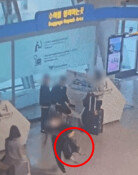THAAD ignored at New Year’s national security briefing
THAAD ignored at New Year’s national security briefing
Posted January. 05, 2017 07:13,
Updated January. 05, 2017 07:20
Acting President Hwang Kyo-ahn started receiving briefings on government work plans on Wednesday, beginning with foreign affairs and national security-related agencies. The schedule has been advanced by more than 10 days, given that President Park Geun-hye was debriefed about New Year’s work plans on Jan. 14–26. Acting President Hwang opted to get briefings from foreign affairs and national security related agencies first, unlike last year when economy-related ministries were the first to report plans to the president. The reporting schedule of this year was an appropriate decision, which has been made by taking into consideration grave security situations surrounding the Korean Peninsula that is changing rapidly in the wake of North Korea’s open threat to launch an intercontinental ballistic missile (ICBM) from early days of the New Year.
The reason is that amid leadership vacuum with the head of state and commander-in-chief position maintained as an acting post, the international community is also warily watching South Korea to see whether the country will be able to properly cope with an unexpected crisis situation, let alone taking preemptive response. In recognition of this situation, Foreign Affairs Minister Yun Byung-se said, “This could be the preclude to the biggest change in world order since the end of the Cold War,” while Acting President Hwang said, “This year is an important time that could be a watershed in the North Korean nuclear issue.”
However, looking into the detailed content of briefings, one will be hugely disappointed and can even question whether such briefings are necessary at all. Each ministry and agency has only emphasized continued implementation of existing policies by stressing "consistency" and "continuity" of policies, and has thus failed to even discuss the biggest pending security issues in recent months, let alone presenting specific solutions.
Notably, regarding South Korea-China conflict over the planned deployment of the terminal high-altitude area defense in South Korea, the National Defense Ministry’s 15-page briefing material had just one line, reading, “Wirth regard to THAAD, we will continue to seek ways of cooperation with China, while continuously explaining our position to Beijing.” Even in the discussion session that followed the briefing, the THAAD issue was not reportedly mentioned at all. Even though main opposition Democratic Party lawmakers who have visited China despite controversy over "diplomacy of toadyism" have announced that they will seek to ease the Chinese government’s order to boycott Korea, including restriction of Chinese tourists’ visit to South Korea, rejection of applications to fly chartered flights bound for South Korea, and ban on Korean Wave stars’ appearance on Chinese TV networks, the government did not even bother to mention this issue at all.
The THAAD system might be an issue that no one wants to address in the wake of impeachment motion against President Park, which is being reviewed by the Constitutional Court. It would be more so among bureaucrats. The National Defense Ministry predicts that the timing of THAAD deployment will be around June at the earliest. Are bureaucrats judge that THAAD deployment is an issue that will go up in smoke if the Constitutional Court upholds impeachment and as a result an early presidential election takes place around April? If briefings are held in a way that bureaucrats avoid pushing for a task that they could be held responsible after the inauguration of the next administration, such briefings would be more efficient if done through written memos.
klimt@donga.com







